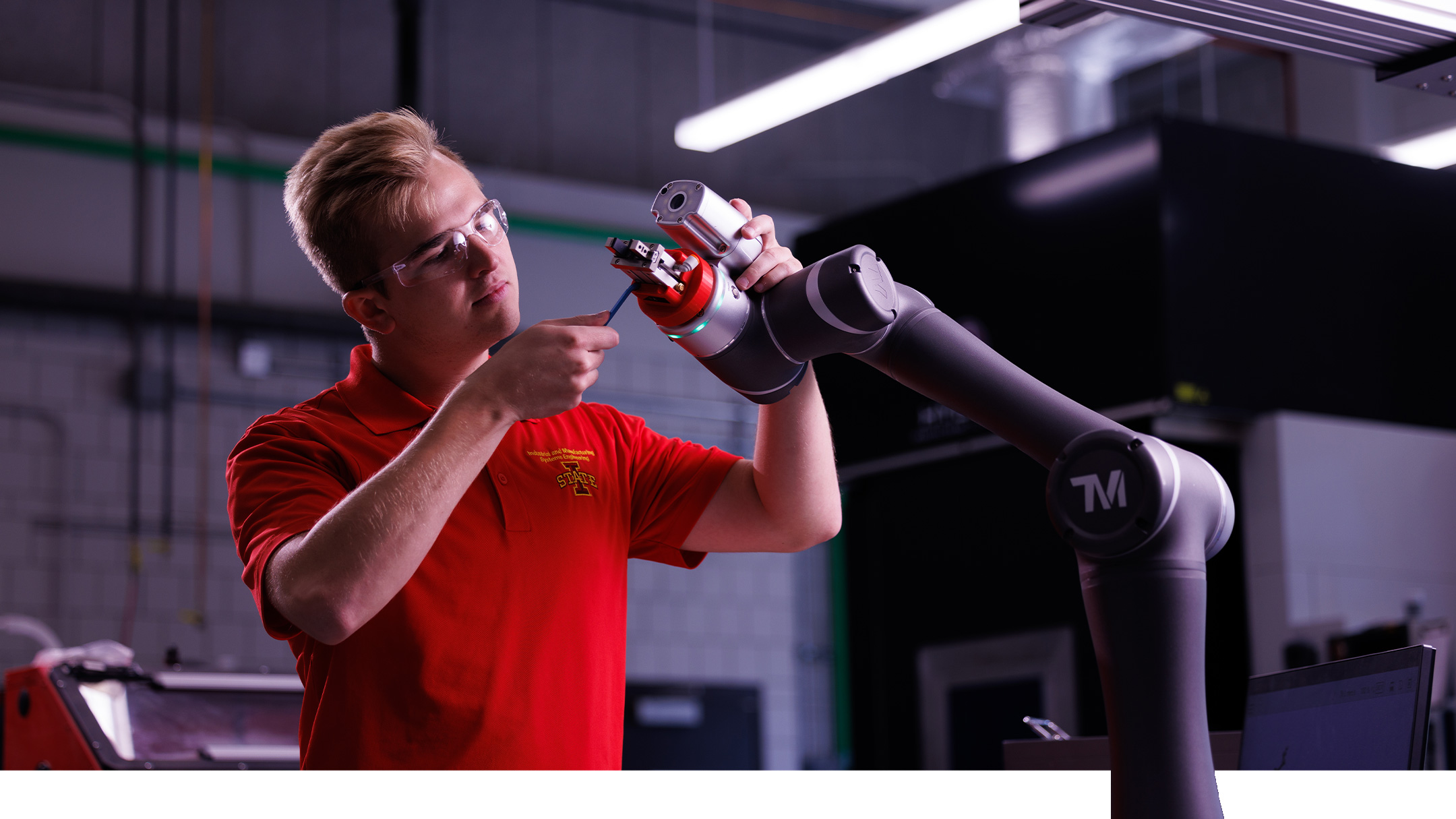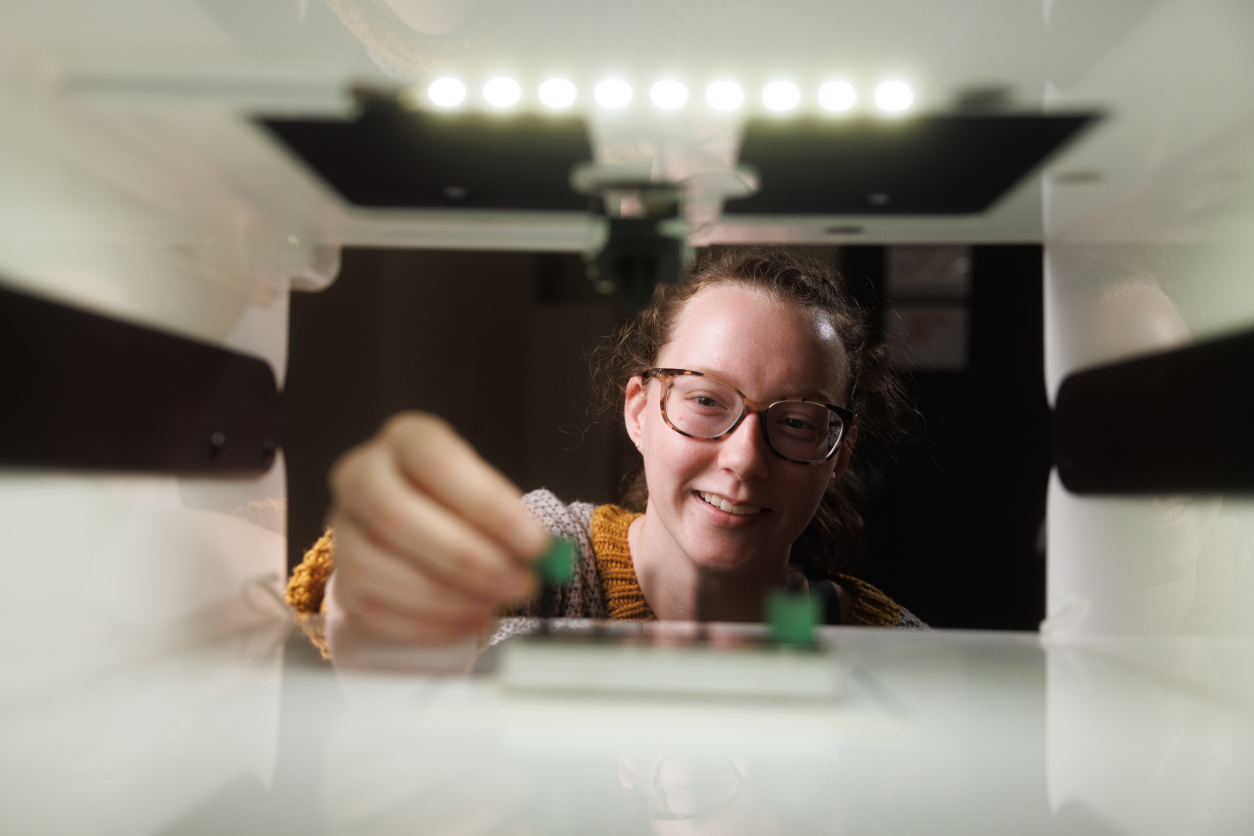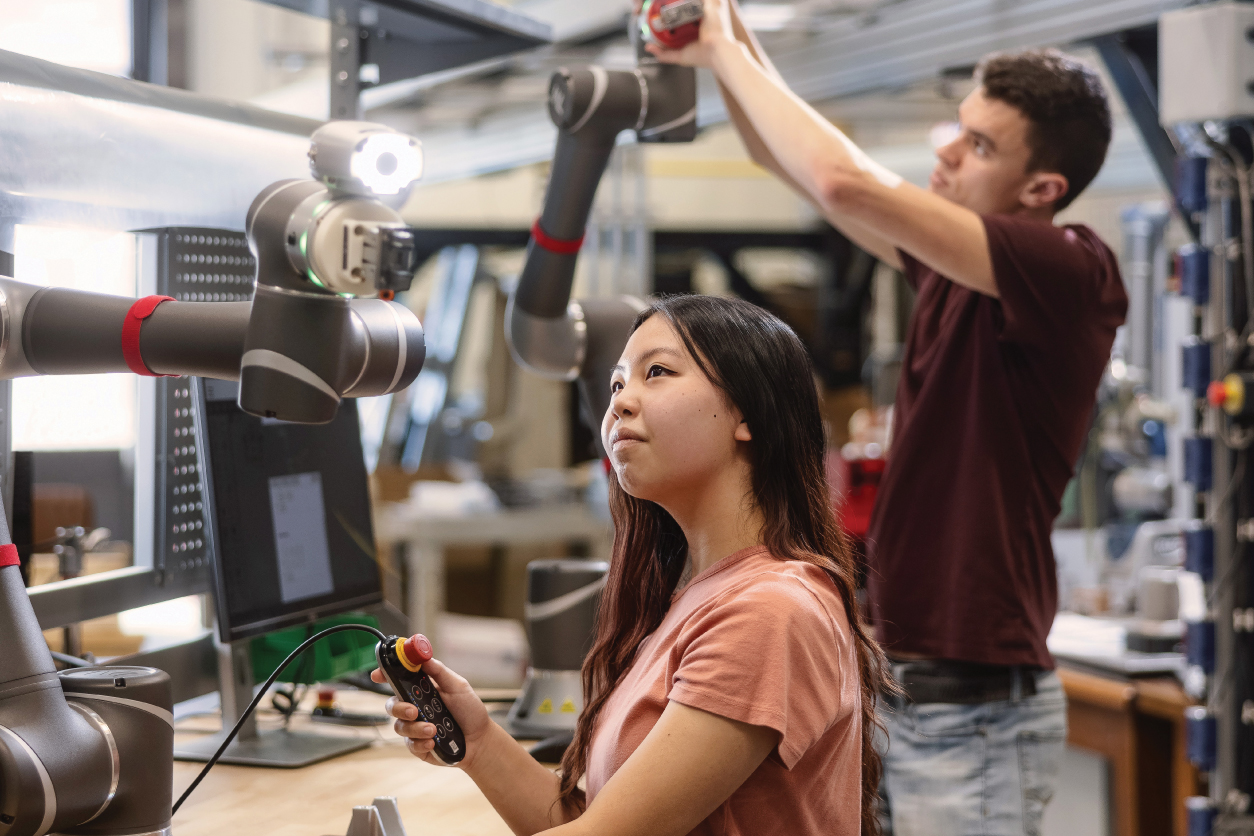Industrial Engineering

An Industrial Engineer
in the Making
Industrial engineering makes the world better, faster, cheaper, and safer by improving the processes that get things done. Our graduates design, build, analyze, and continuously improve systems in all industries, including manufacturing, healthcare, entertainment, construction, energy, and transportation.
-
97%
employed or continuing education within six months of graduation
-
$78,400
average starting annual salary
-
$25/hr
average earnings for internships and co-ops
A competitive advantage
Iowa State Engineers get hired. And we’re here to help connect you to internships and full-time jobs.
- 1,400 employers recruit engineering students each year
- One-on-one career advising
- Networking opportunities
Community and Support
College is more than just academics. Join the community and you’ll find friends, new perspectives and experiences—and support.
- Learning communites
- Clubs and student organizations
- Support resources and groups




Iowa State Engineering teaches work ethic and collaboration like no other. Being a Cyclone Engineer means lifting each other up and working hard.
Kara Albrecht, industrial engineering
What can I study?
In class, you will learn the fundamentals of the profession and develop specific expertise in areas that interest you:
- Advanced manufacturing: Plan a successful manufacturing operation by studying processes, production systems and quality-control procedures.
- Systems engineering and engineering management: Learn to manage a successful company by taking courses like supply chain management, technical sales, economics, marketing and accounting.
- Human factors and ergonomics: Study the relationship between people and their physical environment, design safer and more productive workspaces.
- Operations research and data analytics: Find the best solution for improving a system by optimizing inventory, scheduling, transportation, smart online sales and renewable energy.
For the 2024-25 academic year, our industrial engineering students preferred these minors:
Industrial Engineering at Iowa State
The industrial engineering department is small enough for you to have personal attention from faculty, but large enough to choose from a variety of educational opportunities.
-
Engineering sales minor
Engineering sales minor
With approximately 15% of engineering job postings involving product sales, marketing or customer field support, a minor in engineering sales can be a critical step towards a great job offer. Besides being one of the best paid positions in engineering, technical sales offers substantial travel opportunities and the ability to solve customers’ engineering problems in the field working with people. Talk to your advisor to see how just a few additional courses could fit into your schedule and fast-track your job prospects.
-
Industry careers
Industry careers
If you want a flexible career path, industrial engineering is for you. Consider these industry products and services that people use every day and where these career paths can take you:
- Manufacturing: Help make better quality products that last longer and are produced at a competitive price
- Health care: Save lives by ensuring quality and consistency in producing medical devices, designing hospital processes that allow people to see doctors sooner, and make treatments more efficient and effective.
- Technical sales: Companies hire industrial engineers to sell their technical products to other companies, because they use their problem solving skills to show how the products can add value. Combine your technical and communication skills to meet this industry-wide need.
- Transportation: Help airlines determine the best schedules so that customers are satisfied with travel options while reducing operating costs.
- Financial analytics: Help financial services companies make decisions under uncertainty to maximize stakeholder benefits while reducing operating costs.
-
Hands-on learning
Hands-on learning
You won’t just hear about concepts. Our laboratories and industry projects provide many opportunities for hands-on learning including:
- Applied ergonomics
- Machining processes
- Metalcasting
- Metrology
- Operations research and production systems
- Rapid manufacturing and prototyping
- Technical sales engineering
- Welding processes
- Industrial automation systems
Better. Faster. Cheaper. Safer.
Industrial engineers help people get more out of life by improving the work environment, providing better service and reducing the cost of products that people buy. They find new ways to reduce times in lines at amusement parks, create optimal schedules for professional sports leagues, and design admissions procedures at hospitals. Industrial engineers work at Fortune 500 companies and small businesses to create systems that are safer, more responsive to customers, less expensive, and healthier for the environment.
Each year, Iowa State awards millions of dollars in scholarships to students. Learn more about scholarship opportunities for:
More information about cost of attendance and other types of aid is available from the Office of Student Financial Aid.
Orientation is for students who have accepted admission to Iowa State and plan to enroll in an upcoming term. During orientation you will be provided the opportunity to:
- meet with an academic advisor
- register for classes
- obtain your ISU card
- become familiar with the campus
- increase knowledge of important policies and procedures
The basic program for engineering majors is a set of courses common to all engineering curricula. Students normally enroll in the majority of the basic program courses during their first year.
Learn more about new student orientation and the first-year engineering program.
- 8,225 engineering students (fall 2024), the largest college on the Iowa State campus, with the support of 500+ engineering faculty and staff dedicated to teaching, research and student achievement.
- 75% of Iowa State engineering students graduate with engineering work experience. Internships and co-ops, learning communities, study abroad, 90+ engineering organizations give the hands-on experience to help shape student success.
- Our bachelor of science degree programs are accredited by the Engineering Accreditation Commission of ABET.
- More college facts and highlights
What courses should I be taking in high school to prepare for a engineering degree?
Many high school students have access to college-level courses in high school. We know it’s in your nature to maximize your opportunities.
Learn more about what’s required, what’s recommended and what will transfer
What kind of a laptop computer will I need?
Iowa State University students are required to own or obtain a laptop computer appropriate to your discipline and program of study.
College of Engineering laptop computer recommendations
Can I study abroad?
Engineering International Programs can help you find study or work abroad experiences suited to your interests and goals. Expert staff can assist with course enrollment and transfers to keep you on track for graduation.
Learn more about Engineering International Programs
Are there ways to get practical work experience while at Iowa State?
Participation in a co-op or internship is a great way to gain real-world work experience. Students are employed by industry and government organizations in positions related to their major field of study. Unlike a typical part-time or summer job, an engineering co-op or internship must Involve the Practice of Engineering, and students must be paid. Co-ops and internships are not required by the college, but they are highly encouraged.
Learn more about Internships and Co-ops
There are also opportunities for students to work alongside professors doing research in areas related to their major field of study.
Learn more about Undergraduate Research Opportunities
Engineering Recruitment and Student Services
1300 Marston Hall, 533 Morrill Road, Ames, IA 50011
Phone: (515) 294-7186
Office Hours: Monday-Friday, 8 a.m.-5 p.m.

